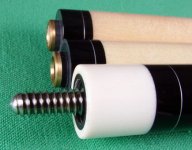I am getting ready to purchase a fancy custom cue from a well known cuemaker. I am going to spend quite a bit and I am considering getting an ivory joint.
The cuemaker uses a piloted ivory joint with a phenolic inner wall. How well do these generally hold up? Should I go with a piloted stainless steel joint? Since this a rather expensive cue I want it to last a long time.
Also, what is the general lifespan of an ivory joint like the one I discribed?
Thanks!
The cuemaker uses a piloted ivory joint with a phenolic inner wall. How well do these generally hold up? Should I go with a piloted stainless steel joint? Since this a rather expensive cue I want it to last a long time.
Also, what is the general lifespan of an ivory joint like the one I discribed?
Thanks!

